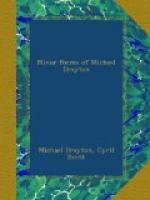Probably before Drayton went up to London, Sir Henry Goodere saw that he would stand in need of a patron more powerful than the master of Polesworth, and introduced him to the Earl and Countess of Bedford. Those who believe[8] Drayton to have been a Pope in petty spite, identify the ‘Idea’ of his earlier poems with Lucy, Countess of Bedford; though they are forced to acknowledge as self-evident that the ‘Idea’ of his later work is Anne, Lady Rainsford. They then proceed to say that Drayton, after consistently honouring the Countess in his verse for twelve years, abruptly transferred his allegiance, not forgetting to heap foul abuse on his former patroness, out of pique at some temporary withdrawal of favour. Not only is this directly contrary to all we know and can infer of Drayton’s character, but Mr. Elton has decisively disproved it by a summary of bibliographical and other evidence. Into the question it is here unnecessary to enter, and it has been mentioned only because it alone, of the many Drayton-controversies, has cast any slur on the poet’s reputation.
In 1593, Drayton published Idea, the Shepherds Garland, in nine Eclogues; in 1606 he added a tenth, the best of all, to the new edition, and rearranged the order, so that the new eclogue became the ninth. In these Pastorals, while following the Shepherds Calendar in many ways, he already displays something of the sturdy independence which characterized him through life. He abandons Spenser’s quasi-rustic dialect, and, while keeping to most of the pastoral conventions, such as the singing-match and threnody, he contrives to introduce something of a more natural and homely strain. He keeps the political allusions, notably in the Eclogue containing the song in praise of Beta, who is, of course, Queen Elizabeth. But an over-bold remark in the last line of that song was struck out in 1606; and the new eclogue has no political reference. He is not ashamed to allude directly to Spenser; and indeed his direct debts are limited to a few scattered phrases, as in the Ballad of Dowsabel. Almost to the end of his literary career, Drayton mentions Spenser with reverence and praise.[9]
It is in the songs interspersed in the Eclogues that Drayton’s best work at this time is to be found: already his metrical versatility is discernible; for though he doubtless remembered the many varieties of metre employed by Spenser in the Calendar, his verses already bear a stamp of their own. The long but impetuous lines, such as ’Trim up her golden tresses with Apollo’s sacred tree’, afford a striking contrast to the archaic romance-metre, derived from Sir Thopas and its fellows, which appears in Dowsabel, and it again to the melancholy, murmuring cadences of the lament for Elphin. It must, however, be confessed that certain of the songs in the 1593 edition were full of recondite conceits and laboured antitheses, and were rightly struck out,




